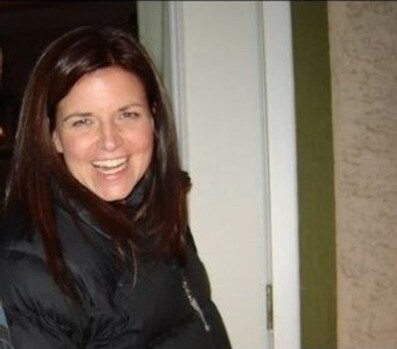
Amanda Alexander is a professional script supervisor working in television production in Canada. She has collaborated with Louis for many years and on three different shows.
Amanda joined The Friends of Louis Ferreira with an exclusive interview in Ferreira Fest 72, which is included below.
All photos on this page are © Amanda Alexander.
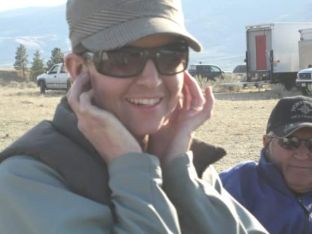
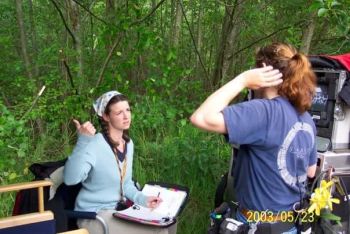
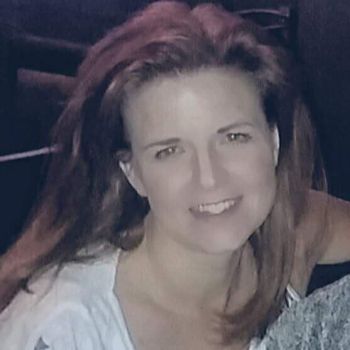

AN INTERVIEW WITH AMANDA ALEXANDER
FF – Hi, Amanda. This is Bea from Ferreira Fest and we’re so happy to have you with us this month. Welcome!
AA – Oh, thank you so much, I’m so happy to be here.
FF – All right. Let’s start with something really simple. Who is Amanda Alexander and what gets you up in the morning?
AA – Oh my goodness. Well, usually work gets me up because I have to work. But I do enjoy it. I also am a mother of two. I have a thirteen year old and a nine year old, and a wonderful husband who allows me to do what I love to do, which is work in film.
FF – Wonderful. So you are, currently, the script supervisor for Motive. How did you get to be a script supervisor, and who helped you along the way? How did you get into this business?
AA – Well, many, many years ago, in high school, you had to decide what you wanted to do, and I knew from a really young age that I wanted to get into film or television. And, I decided to go to film school. I went for a two year program. And when I graduated, in order to get into the business of film, you needed to join the union. And that’s when it gets a little complicated.
So, I looked into it, and I found out that in my local, where I lived, which was in Calgary, Alberta, there was one script supervisor in the union. And I thought, well, they need more than one. So that’s really how it started for me, was simply to get in the union.
FF – Yeah.
AA – And I ended up meeting the one script supervisor in Alberta who was kind enough to say to me that she would take me on and train me. And the rest is kind of history. I trained with her for about a year and a half on a television series, a Canadian show, called North of 60. And she ended up leaving the show and I took it over. And twenty-four years later, here we sit.
FF – That’s amazing. So you saw a need and an opening and an opportunity to make a difference and you took it. That’s fantastic.
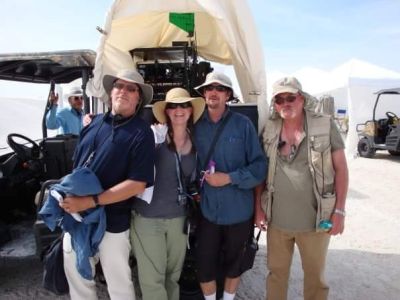
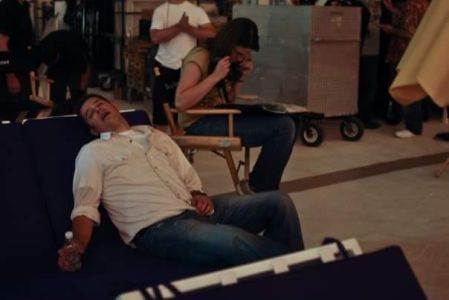
AA – Exactly, exactly.
FF – That is great.
AA – It worked out very well for me.
FF – Yeah, who needs another one of a thousand whatever is already there when you find one place where there’s only one.
AA – Yes. And script supervising now is a lot more well-known.
People know what we do more. Back then, it was kind of a position that nobody really knew much about. There was no place to go and learn it. They didn’t teach it in school. If you wanted to learn anything, you had to go check out the one book that was available.
FF – Right.
AA – So, there wasn’t a lot of people around doing it, or at least where I was there wasn’t. So, yeah, it kind of worked out really well for me.
FF – That’s fantastic. Tell us a little bit about what a good day on the job looks like. What’s the holy grail for a script supervisor? When everything goes like, “yes, I’m top of the world and I’m the queen of all script supervisors”. How does that work?
AA – There’s no day like that. Because every day is new and every day is different. And I’m learning something new every day.
A good day, though, for me would be just basically having everyone on set trust you. Because if you say something to them, they have to trust that you know what you’re talking about. That goes all the way from the actors to the director to the director of photography to the gaffer. When you speak, you have to know that what you’re saying is absolutely true and right. And have all those people also believe that for you.
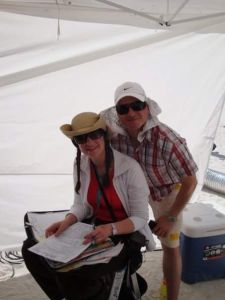
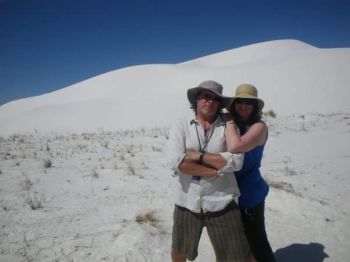
If we speak, everybody just kind of groans because they know we either have to do the take again, or something has happened that we have to fix. And so you have to be the person who can fix the problem quickly and keep moving. And you have to have everyone trust that that’s exactly what you’re going to do.
FF – Yeah.
AA – Because you know that you have everyone’s trust.
FF – So, you’re on set with the film crew and you’re sitting there with a script, and what exactly is it that you do, during the shooting?
AA – Well, that is a very complicated answer. The best, the quickest way to describe the script supervisor job would be a liaison between the director and the editor. So everything that happens on set, our job is to make sure that it seamlessly gets put together by the editor. That the editor isn’t going to have to try and find something to make it work. We work with everybody, we work with the actors, we work with the director, we work with lighting.
There isn’t a day that goes by that a script supervisor doesn’t talk to pretty much everybody on the set.
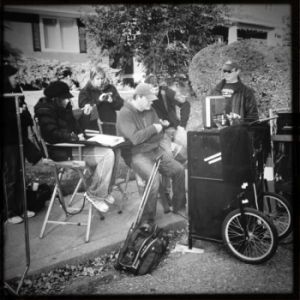
And the first thing you have to do when you first sit down at a job is to get the director’s trust and the actors’ trust. And once you have that, your job can be pretty easily done.
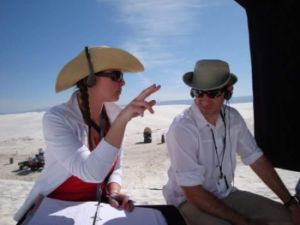
FF – So, it’s all about continuity, for you?
AA – Yes and No. I’ve been doing this job a really long time and for me, continuity is important. It’s very important because you don’t want to take an audience away from something because something’s off, that it doesn’t match. You want it to go seamlessly. Nothing is seamless, though. And actors, when they’re acting they’re doing their thing and they don’t necessarily want to think about their continuity. Because they’re in a moment.
So for me, having done this job for so long, the most important part, is the acting and whether or not I believe it. If I can believe it, I can forgive a continuity error. Does that make sense?
FF – Yes. Absolutely.
AA – And so for me I would rather not go in to try and correct an actor on a continuity error if I think it’s going to screw up their performance. Because some actors, it gets in their head then and they start thinking too much about what they should be doing as opposed to just letting it live.
So that’s something I’ve learned over the years. Continuity is very important, but it’s not the most important thing. The most important thing is that the story is awesome, and that you believe the actor.
FF – On the opposite end of the spectrum, what kind of day makes you want to run screaming into the night?
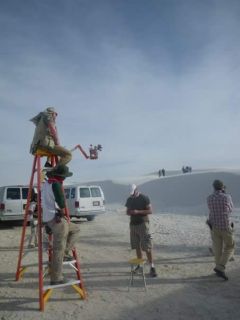
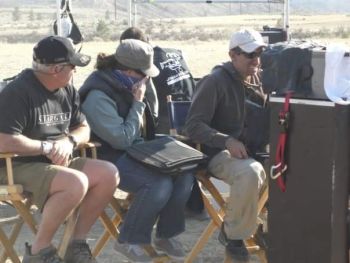
AA – When they have six cameras and 10 cast members in a scene, and every other person on set has extra help, except you. You’re a one person department, all the time. And you have a director who is difficult to deal with, who doesn’t necessarily like to listen to what you have to say. The same goes for actors, too, you can have some actors who don’t want you near them. And so those days can be very difficult and challenging, to say the least.
FF – You deal mostly, on the job – I’m guessing here – you deal mostly with other people’s scripts. Are you a writer as well? Do you do any writing?
AA – I don’t. I’m not a blank page writer at all. And I would never profess to be one. It’s a really difficult job, that’s not my skill set. What I am really good at is fixing problems. If something’s on set and it’s not working, which happens all the time, actors having trouble with dialogue because it just doesn’t fit in their mouth, or doesn’t seem to fit the character, I’m really good at quick fixes. So I can rewrite things quite quickly and make them work. That is something that I’m actually very good at.
FF – Fabulous. You’re working on one show after another and I know you’re sort of alternating between Motive and Cedar Cove, right? Just depending on when they’re shooting?
AA – Yes.
FF – What makes working on Motive different from other shows that you’ve worked on?
AA – Motive is a completely new situation and it’s unlike any show I’ve worked on before.
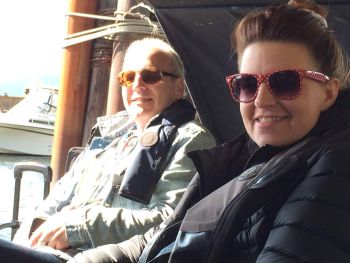
The actors are amazing. A joy to watch. And the style of Motive is a very different. There’s no rhyme or reason to how we shoot. We kind of just let it happen. Which can make my job very, very difficult.
When every time we roll the camera we’re shooting something new and something different. It makes my job a big challenge because I have to figure out what’s important, what I definitely need to make sure matches, and how it’s going to flow together, because we shoot so organically on that show that sometimes you kind of get lost in it. And I’m the only one on set who has to keep track that we’re getting everything we need and that the story is coming through and it’s all making sense. It’s a very fast paced show.
FF – That’s awesome. You’ve worked with Louis for almost four years, on Motive. And before then you’ve worked with him on Stargate Universe for two years and you also worked on that one episode of Millennium that he was in, The Pest House. So, do you have any special or funny memories of working with him?
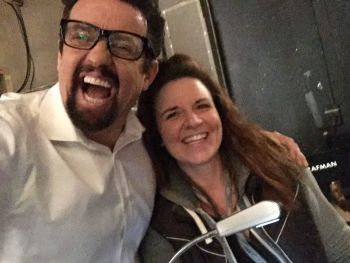
AA – Oh, Louis is one of my most favorite, favorite actors to work with. He comes prepared like no other actor I know. He knows exactly what he needs, and what he needs to do for the scene. It’s a joy to work with someone like that.
He’s very warm and giving and he allows me to be part of his process, which is huge. I get to give him my opinion on things when he’s either stuck on something or something’s not working for him.
He allows me to have a dialogue with him to help him get to where he needs to be or pull him back from where he’s going because sometimes it’s not working. And he really trusts that I know that. And for me, working with actors like that is phenomenal. It just heightens my job to the next level. And he does that for me.
FF – Any special moments that you remember?
AA – Any special moments? You know, when we did SGU, which was still a pinnacle in my career, one of the best experiences I’ve ever had on a film set, I remember him and Bobby Carlyle were kind of the adults among the actors, and they kept everyone straight. And, when you have two lead actors who are so professional and so sweet and so prepared all the time, it filters down to everyone else.
And I remember that about Louis, that he would come in and, because he was playing our commander, he had to be in charge of everyone. And he kind of did that even amongst the crew when we weren’t rolling the cameras.
And I remember just watching him keeping everybody together and keeping the set really light and fun, because a lot of times the subject matter that we were shooting on SGU was pretty heavy stuff.
And so he would always be the voice of comedy and of fun and I really remember that about him.
FF – That’s great.
AA – And he’s still that way today.
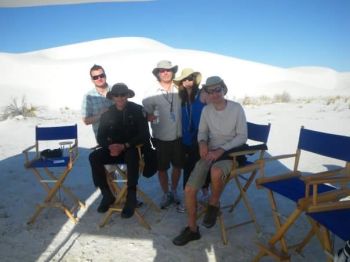
FF – Yeah, and you know what, it’s funny, but it really does show when you watch it on screen. You do notice that ensemble feeling. Very, very much.
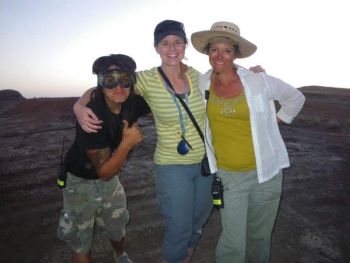
AA – Completely. And like I said, SGU and Motive are two of my favorite jobs. Motive has a great crew and a great cast. And, you know, when you work with people for twelve to fourteen hours a day every day they become your family. And it’s “instafamily ‘. And you either have it or you don’t. And both those two shows had it in spades.
And to this day I’m still in contact with most of the cast from SGU. We became friends and we’re interested in each other, and what we’re doing outside of work. Which is fantastic.
FF – Right. That’s great.
So now, here comes the tricky question. If you could describe Louis in four words, what would they be?
AA – Oh boy. It’s not that hard actually.
Definitely energetic. Sweet. Okay, maybe it’s a little hard. Because those two words just encompass him so much. Powerful. I would say powerful. And prepared.
FF – Those are great words, Amanda.
AA – I have a different perspective on Louis, than I think a lot of people, because of how we work together, so…
FF – Yeah. You are on Twitter. Is that the best way for people to keep up with you?
AA – I try to do Twitter as much as possible. Yeah, I’m always checking it out and seeing if anybody’s contacted me and wants to know anything about what I’m working on and all that kind of thing. I use Twitter pretty much for my professional life, but occasionally I’ll put something personal on there but most of the time it’s about the shows I’m working on. So if anybody’s interested in anything that I’m on or have worked on, yeah, Twitter’s a great way to get a hold of me and ask any questions they might have.
FF – All right, fabulous! Thank you so much for your time, Amanda. It’s been an adventure getting you on the phone but it was totally worth it.
AA – Thank you for being interested in me, it’s kind of nice!
FF – Thank you so much for your time. And we’ll talk to you again soon.
AA – All right, thank you so much.
Thanks to Casey for the transcript, and to Amanda for the edits!
Check out Amanda’s IMDb listings.
Follow Amanda on Twitter!
Visit Amanda’s Instagram feed.
Q: What does a script supervisor do when she needs a lanyard for her stopwatch and there isn’t a piece of string for miles around?
A:
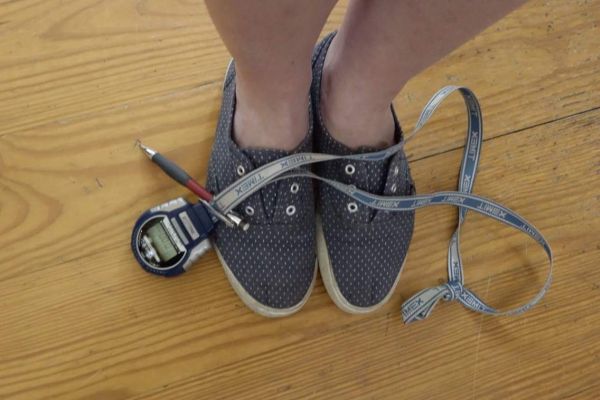
(from a still photographer’s “where my feet are” series)
